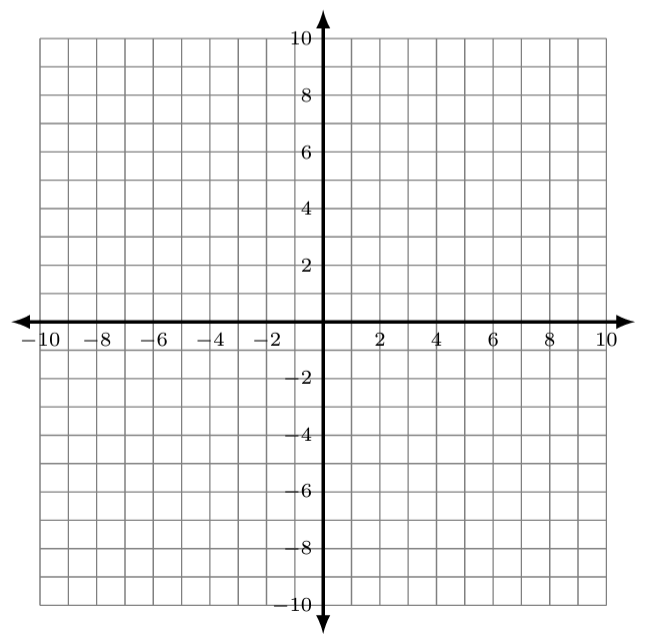3.5 Inverse Functions – ln(x) and e^x
3.5.1 Classwork
A. Use a calculator to fill in the tables and sketch the two functions on the same graph.
- [latex]f(x)=e^x[/latex]
[latex]{\color[rgb]{1.0, 1.0, 1.0}\boldsymbol x}[/latex] [latex]{\color[rgb]{1.0, 1.0, 1.0}\boldsymbol y}{\color[rgb]{1.0, 1.0, 1.0}\mathbf=}{\color[rgb]{1.0, 1.0, 1.0}\boldsymbol e}^{\color[rgb]{1.0, 1.0, 1.0}\mathbf x}[/latex] [latex]-3[/latex] [latex]-2[/latex] [latex]-1[/latex] [latex]0[/latex] [latex]1[/latex] [latex]2[/latex] 
- [latex]g(x)=\ln(x)[/latex]
[latex]{\color[rgb]{1.0, 1.0, 1.0}\boldsymbol x}[/latex] [latex]{\color[rgb]{1.0, 1.0, 1.0}\boldsymbol y}{\color[rgb]{1.0, 1.0, 1.0}\mathbf=}{\color[rgb]{1.0, 1.0, 1.0}\mathbf ln}\mathbf{\color[rgb]{1.0, 1.0, 1.0}\left(x\right)}[/latex] [latex]0.05[/latex] [latex]0.14[/latex] [latex]0.37[/latex] [latex]1[/latex] [latex]2.72[/latex] [latex]7.39[/latex] - How are the x- and y-coordinates of these two functions related? Give the domain and range for each function.
B. Use a calculator to evaluate. Give exact answers when possible, and round approximate answers to two decimal places.
- [latex]ln(1)[/latex]
- [latex]ln(8)[/latex]
- [latex]ln(800)[/latex]
- [latex]ln(8,000)[/latex]
-
- How are the inputs changing in problems 4 through 7 above?
- How are the outputs changing in problems 4 through 7 above?
- What is the difference between how the inputs are changing versus how the outputs are changing in problems 4 through 7 above?
C. Evaluate.
- [latex]\sqrt{3^2}[/latex]
- [latex]\sqrt{13^2}[/latex]
- [latex]e^{In\left(7\right)}[/latex]
- [latex]\ln(e^5)[/latex]
- [latex]\ln(e^8)[/latex]
- [latex]e^{\ln(15)}[/latex]
D. Identify the variable, then solve for the exact answer.
- [latex]400=50e^{k10}[/latex]
- [latex]\ln(2x)=0[/latex]
- [latex]\ln(x-2)=1[/latex]
- [latex]\ln(x-2)=0[/latex]
- [latex]50=Pe^{0.06⋅10}[/latex]
- [latex]25=50e^{k7}[/latex]
E. Solve. Round approximate answers to two decimal places.
- If [latex]\$1,000[/latex] is invested, how long will it take to double to [latex]\$2,000[/latex] at a [latex]3\%[/latex] rate of interest compounded continuously?
- Stan takes out an [latex]\$800[/latex] student loan. In three years and after making no payments but accruing interest continuously, he owes [latex]\$1,100[/latex]. What rate of interest is Stan being charged?
- Jill wants to invest some money for her new nephew. She finds a CD that will pay [latex]4.25\%[/latex] interest compounded continuously for the next twenty years. If she wants the future value of the CD to be [latex]\$5,000[/latex], how much does she need to initially deposit?
3.5.2 Homework
A. Solve.
- [latex]e^{3x}=12[/latex]
- [latex]e^x=72[/latex]
- [latex]250=50e^{0.06t}[/latex]
- [latex]25=50e^{-0.0000124t}[/latex]
- [latex]25=50e^{15r}[/latex]
- [latex]\ln(x)=3.548[/latex]
- [latex]2\ln(3x+1)=10[/latex]
- [latex]ln(4x-7)=1[/latex]
- [latex]2300=1000(1+r⋅15)[/latex]
- [latex]I=1000\cdot r\cdot12,\;\text{where}\;r\;\text{is}\;0.2\%[/latex]
B. Spot the error and correct it.
- [latex]\ln\left(x\right)+20=35[/latex]
[latex]x+20=e^{35}[/latex]
[latex]e\wedge\ln\left(x\right)+20=e\wedge35[/latex]
[latex]x=e^{35}-20[/latex]
- [latex]\ln\left(50x\right)=0[/latex]
[latex]e\ast\ln\left(50x\right)=e\ast0[/latex]
[latex]50x=0[/latex]
[latex]x=0[/latex]
C. Solve. Round approximate answers to two decimal places.
- [latex]\$7,000[/latex] is invested at [latex]8.5\%[/latex]. How long will it take the investment to grow to [latex]\$10,000[/latex] if it is compounded continuously?
- [latex]\$7,000[/latex] is invested at [latex]8.5\%[/latex]. How long will it take the investment to double if it is compounded continuously?
- Earning a [latex]6\%[/latex] interest rate, compounded continuously, how long will it take an investment to:
- double?
- triple?
- Jeff owes [latex]\$83,813[/latex] to a debt collector after borrowing money at [latex]7.25\%[/latex] interest compounded continuously and failing to make payments for two years. How much did he originally borrow?
- If your money grew to [latex]\$12,000[/latex] invested under simple interest on an investment of [latex]\$10,000[/latex] in five years, what is the rate of interest?
- Jack would like to invest [latex]\$3,000[/latex] for 15 years and end up with [latex]\$6,500[/latex]. Assuming he will earn interest compounded continuously, what rate of return will he need to earn?

